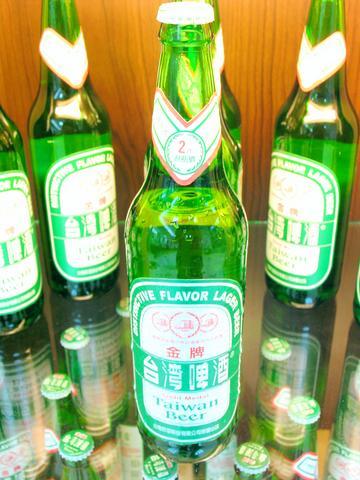The changing face of Taiwan Beer is epitomized by a beaming Joanne Tsai, who can be found most weekends serving up the local beverage at seafood restaurants in Taipei, kitted out in a tiny outfit.
Taiwan Beer girls dress in the company's green and white livery, with short skirts and exposed midriffs and scarves on their heads to prevent hair falling in patrons' meals and green wristbands that hold a bottle opener.
Not just anyone can be a Taiwan Beer girl. They must be reasonably tall, with a good appearance and strong academic background. They represent the new look of Taiwan Tobacco and Liquor Corp (TTL, 台灣菸酒公司) and as such there are strict rules to protect the company's image: Taiwan Beer girls may not accept tips, sit down with customers, or drink on duty. A TTL representative always accompanies them on assignments.

While foreign beer companies like Budweiser, Coors and Heineken have long promoted their products by employing beer girls, it's a new marketing strategy for TTL, which used to have a monopoly on selling tobacco and alcohol, but now finds itself having to adapt to changed circumstances and fight for market share.
Part of this battle is about overhauling its image as the beverage of choice for middle-aged men with betel-nut stained teeth and trying to re-cast the drink to appeal to a younger generation of drinkers. Hence the Taiwan Beer girls.
The tobacco and wine monopoly bureau was established during Japanese colonial rule and was taken over by the Chinese Nationalist Party in 1945 and renamed the Taiwan Tobacco and Wine Monopoly Bureau (

Until 1987, when the nation's beer market was opened to foreign imports, Taiwan Beer held 99 percent of the market, said Hsu An-hsuen (
Foreign beers gradually increased their stake in the market and hit a peak at 26 percent in 2002, when the nation joined the WTO.
In that year, China was permitted to export beer to Taiwan and quickly snatched an 8 percent share, with the best-seller Tsingtao taking 6 percent.
But China's brewers were hurt by reports that its drinks contained the carcinogen methanol. Now, China's 13 beer brands account for just 3 percent of the local market, according to TTL's vice president Martin Tsai (
Heineken is currently the best-selling foreign beer with 4 percent of the market, on the back of its aggressive marketing ploys aimed at young people in clubs and pubs. The world's number one DJ Tiesto, for example, was sponsored by Heinekin for his world tour which took in Taiwan.
In contrast, rock star Wu Bai (
TTL Chairman Morgan Hwang (
Hwang said that as a result of the company's marketing strategies, TTL had regained market share since 2002. "Last year's revenues were NT$21.8 billion, or 82.8 percent of the nation's beer market, and we look to expand to NT$24.4 billion by December [this year]."
Gold Medal Taiwan Beer was introduced last April, with a 330ml bottle version of the drink launched around the same time, so that it could compete with foreign beers in the critical pub and club markets.
A lot rests on Gold Medal because it was designed to appeal to younger drinkers and in May this year, 144 young women were hired to promote the beer.
Initially, the girls were sent out to seafood restaurants and small pubs to consolidate TTL's customer base. "This is the first step to produce publicity and create issues for our new product," said Martin Tsai. "The restaurant owners told me when our Taiwan Beer girls are around, their business goes up by 10 percent to 20 percent."
While Taiwan Beer girl Joanne Tsai rushed around a restaurant last weekend near the intersection of Songjiang and Minquan roads in Taipei, a table of publicity representatives from TTL extolled the virtues of Gold Medal.
"It's fresh," the reps kept repeating "and a touch spicy" they offered. "And charming," they continued, "just like our beer girls."
"Most of our customers are families and the betel-nut guys after 10pm," the reps said. "But pubs are the battlefield" they added, explaining that night clubs are where most young people drink. So far, however, Taiwan Beer has not been able to make much of an impression on the pub and club scene.
There are plans to remedy this situation. In addition to Taiwan Beer girls being sent out to fashionable pubs and club, TTL intends to hire young male pop idols as spokesmen for Gold Medal. It also plans to organize several major events in the next few months and has signed on as a co-sponsor of the Ho-Hai-Yan Rock Festival at Fulung beach in Tapei County next month.
A limited-edition set of Gold Medal cans featuring sea monsters and the music festival's logo have been specially produced for the event.
In August, TTL will sponsor an outdoor TV broadcast with further special edition Gold Medal cans for the Athens Olympic Games. Also, cultural events are being organized for Chinese Valentine's Day on Aug. 22.
TTL will also tap into the younger market by introducing new drinks such as alcopops, with mixes of vodka and juice.
Alan Hsia, a part owner of Luxy nighclub in Taipei who has a degree in international marketing, said Taiwan Beer's image was changing but more work needed to be done.
"They haven't called me yet, but I've been waiting. I'd definitely be willing to look into it and support the local brand. They're changing their image really quickly but they need to do more to appeal to our customers.
"They need to go beyond the betel nut rock bands that have been giving them their gravy ... But to change preconceived ideas is difficult and it does take time. The best thing they could do, perhaps, is sponsor a Japanese superstar DJ, to get an edge. It's not too far-fetched."
For Taiwan Beer girls like Joanne Tsai on the front lines, the battle for market dominance rages on. But more will need to be done to fend off foreign competitors -- particularly from China -- and secure the loyalty of Taiwan's future beer drinkers.
Meet Taiwan Beer girl Joanne Tsai
Joanne Tsai (蔡旻微)
Age : 24
Born : Taipei
Career : Joanne graduated last year from National Taipei University in public administration. She has had marketing jobs before, promoting beer and working in restaurants, or as a barmaid. "I guess this job suits a little bit of my personality," she says.
Joanne intends to study in England as part of a Christian fellowship and is presently attending cram school to improve her English. She says that she did not believe in Christ before, but is beginning to do so. "It must be destiny," she says.
Assets: Joanne says she was one of 20 girls who turned up for the interview to be a Taiwan Beer girl and won because of her height, experience and because she is polite, confident and personable.
Hobbies: Joanne says her main pastime is looking after her appearance. She takes special care of her skin. The rest of the time, she likes to hang out with her friends.
Meet Taiwan Beer girl Hally Lin>
Hally Lin (
Born :Taipei
Career : Hally graduated this year from Tamkang University in chemistry and is planning to continue her studies specializing in biochemistry, "because this is a trend."
Assets: Hally applied for the Taiwan Beer girl position after seeing an ad on a Web forum. Her younger sister had a similar job and her family is supportive of what she does. She was selected after a photo shoot and says she was instructed how to talk with customers, introduce the products and always be polite. "The company said we have to be loyal to our products. So if I'm a Taiwan Beer girl, I must not be a Heineken girl at the same time," she says.
Hobbies: Hally is a quiet girl and says she leads an easy life. She enjoys surfing the Internet, watching TV and sleeping.

Towering high above Taiwan’s capital city at 508 meters, Taipei 101 dominates the skyline. The earthquake-proof skyscraper of steel and glass has captured the imagination of professional rock climber Alex Honnold for more than a decade. Tomorrow morning, he will climb it in his signature free solo style — without ropes or protective equipment. And Netflix will broadcast it — live. The event’s announcement has drawn both excitement and trepidation, as well as some concerns over the ethical implications of attempting such a high-risk endeavor on live broadcast. Many have questioned Honnold’s desire to continues his free-solo climbs now that he’s a

As Taiwan’s second most populous city, Taichung looms large in the electoral map. Taiwanese political commentators describe it — along with neighboring Changhua County — as Taiwan’s “swing states” (搖擺州), which is a curious direct borrowing from American election terminology. In the early post-Martial Law era, Taichung was referred to as a “desert of democracy” because while the Democratic Progressive Party (DPP) was winning elections in the north and south, Taichung remained staunchly loyal to the Chinese Nationalist Party (KMT). That changed over time, but in both Changhua and Taichung, the DPP still suffers from a “one-term curse,” with the

Jan. 26 to Feb. 1 Nearly 90 years after it was last recorded, the Basay language was taught in a classroom for the first time in September last year. Over the following three months, students learned its sounds along with the customs and folktales of the Ketagalan people, who once spoke it across northern Taiwan. Although each Ketagalan settlement had its own language, Basay functioned as a common trade language. By the late 19th century, it had largely fallen out of daily use as speakers shifted to Hoklo (commonly known as Taiwanese), surviving only in fragments remembered by the elderly. In

Lines between cop and criminal get murky in Joe Carnahan’s The Rip, a crime thriller set across one foggy Miami night, starring Matt Damon and Ben Affleck. Damon and Affleck, of course, are so closely associated with Boston — most recently they produced the 2024 heist movie The Instigators there — that a detour to South Florida puts them, a little awkwardly, in an entirely different movie landscape. This is Miami Vice territory or Elmore Leonard Land, not Southie or The Town. In The Rip, they play Miami narcotics officers who come upon a cartel stash house that Lt. Dane Dumars (Damon)